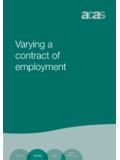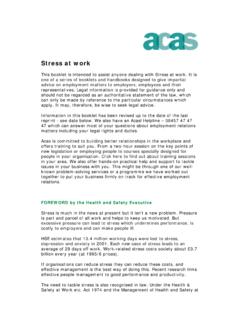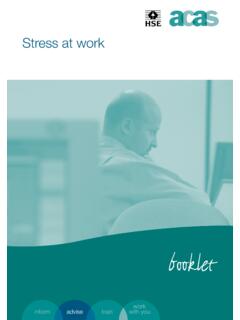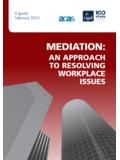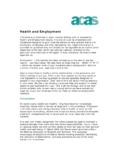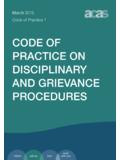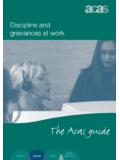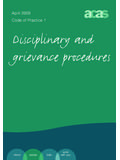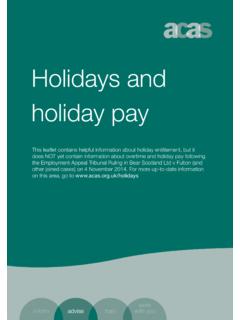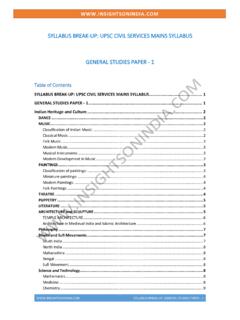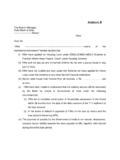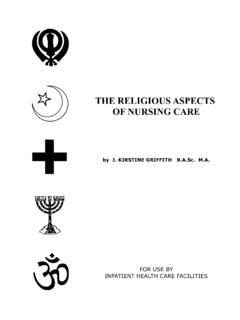Transcription of Guidance Religion or belief discrimination: key points for ...
1 Guidance Religion or belief discrimination : key points for the workplace August 2018 Religion or belief discrimination : key points for the workplace 2 About Acas What we do Acas provides information, advice, training, conciliation and other services for employers and employees to help prevent or resolve workplace problems. Go to for more details. Must and should Throughout this guide, a legal requirement is indicated by the word 'must' - for example, an employer must not ignore an employee for promotion because the employee holds a certain Religion . The word should indicates what Acas considers to be good employment practice. Understanding the term employee Regarding discrimination matters, under the Equality Act 2010, the definition of employee is extended to include: employees (those with a contract of employment) workers and agency workers (those with a contract to do work or provide services) apprentices (those with a contract of apprenticeship) some self-employed people (where they have to personally perform the work) specific groups such as police officers and partners in a business.
2 Job applicants are also protected. Guidance on other parts of the Equality Act 2010 Guidance on other protected characteristics under the Act, and other useful tools and materials can be found at For an overview of how equality legislation applies generally at work, Acas provides the following Guidance : Equality and discrimination : understand the basics Prevent discrimination : support equality discrimination : what to do if it happens. August 2018 Information in this guide has been revised up to the date of publication. For more information, go to the Acas website at Legal information is provided for Guidance only and should not be regarded as an authoritative statement of the law, which can only be made by reference to the particular circumstances which apply. It may, therefore, be wise to seek legal advice.
3 Religion or belief discrimination : key points for the workplace 3 Contents About this guide .. 4 What is Religion or belief discrimination ? .. 4 Religion and religious belief .. 4 Philosophical belief .. 5 How Religion or belief discrimination can happen .. 6 Direct discrimination .. 6 Indirect discrimination .. 7 Harassment .. 8 Victimisation .. 9 Where Religion or belief discrimination are most likely to happen .. 10 Recruitment .. 10 Taking annual leave, breaks and time away from work for religious reasons .. 13 Dress code and appearance .. 15 Considerations for everyone .. 16 Develop policies for handling requests for reasons of Religion or belief .. 17 Job duties and Religion or belief .. 17 Talking about Religion or belief at work .. 18 Unacceptable language .. 18 Food and fasting.
4 19 Behaviours based on religious belief .. 20 Working on a holy day of the week .. 21 Avoiding stereotyping .. 21 Occupational requirements .. 22 Bereavement .. 23 Washing and changing rooms .. 24 Raising and handling complaints .. 24 Further information .. 24 Religion or belief discrimination : key points for the workplace 4 About this guide This guide primarily offers employers, managers, HR professionals, employees, employee/trade union representatives and job applicants a grounding in how to reduce the chance of Religion or belief discrimination happening in the workplace, how it might still occur and how it should be dealt with if it does happen. While employers and employees can be liable for their own acts of discrimination , employers can also be liable for their employees acts.
5 This guide encourages employers to make sure their workplaces are inclusive . For example, so employees feel: they belong are not disadvantaged or under-valued because they hold a certain religious faith or philosophical belief , and their beliefs and/or religious observances are respected. What is Religion or belief discrimination ? The Equality Act 2010 protects employees from discrimination , harassment and victimisation because of Religion or belief , one of nine features known in law as protected characteristics and covered by the Act. This characteristic mainly divides into two areas: Religion and religious belief , and philosophical belief . The Act does not require any minimum length of continuous employment, or any employment for a job applicant, for a discrimination claim to be made.
6 discrimination is unlawful from when a role is advertised and interviewed for, through to the last day of employment and beyond, including any job references. The Human Rights Act 1998 gives a person the right to hold a Religion or belief , and change their Religion or belief . It also gives them a right to show that belief , but not if that display or expression interferes with public safety, public order, health or morals, or the rights and freedoms of others. For information on religious or belief discrimination in Northern Ireland, go to Religion and religious belief What is a Religion is not defined by the Equality Act. However, in line with the European Convention on Human Rights and Britain s Equality and Human Rights Commission s employment statutory code of practice, it is accepted that: a Religion must have a clear structure and belief system a clearly-structured denomination or sect within a Religion can be covered employees without a religious faith, as well as those with a faith, can be protected against discrimination .
7 For example, someone who is not a Hindu would be protected against discrimination because they are not a Hindu Religion or belief discrimination : key points for the workplace 5 what makes up religious belief or practice may vary among people in that Religion no one Religion or branch of a Religion overrides another so an employee is protected against discrimination by someone of another Religion , or of the same Religion or of a different branch or practice of their Religion . For example, it would be discriminatory for an employee to treat a colleague of the same Religion unfairly because they regard them as less orthodox in their belief . The Equality Act does not give a comprehensive list of religions, although its explanatory notes give examples - the Baha i faith, Buddhism, Christianity, Hinduism, Islam, Jainism, Judaism, Rastafarianism, Sikhism and zoroastrianism .
8 Religious belief is an individual s own faith and how it affects their life. Caste discrimination Caste usually refers to the social levels in certain cultures and racial groups, such as in India, where people s positions in society are fixed by birth or occupation, and are hereditary. Caste can also affect life in Britain. In July, 2018, the Government decided it would not specifically add caste discrimination as part of the Equality Act 2010. For some time, some legal opinions and case law have considered caste to be already covered through ethnic origin under the Act. The Government expects employment tribunals and courts to continue to rely on that interpretation. Caste can be linked to Religion . For more on race discrimination , see the companion Acas guide, Race discrimination : key points for the workplace.
9 Philosophical belief Broadly speaking, a philosophical belief must be all of the following: genuinely held not just an opinion or point-of-view based on current information a weighty and substantial aspect of human life and behaviour clear, logical, convincing, serious, important, and worthy of respect in a democratic society, compatible with human dignity and not conflicting with the fundamental rights of others. It is broadly accepted that, for example, humanism, atheism and agnosticism are beliefs , but supporting a football team or loyalty to your native country are not. Political belief It is broadly accepted that supporting a political party is not a philosophical belief under the Equality Act. However, a political philosophy affecting significantly how a person lives their life may be protected.
10 And, under other legislation the Employment Rights Act 1996 - dismissing an employee solely or mainly because of their political opinions or affiliation is likely to be unfair dismissal, unless misconduct by the employee would justify fair dismissal. All protected beliefs are equal whether religious or philosophical so one protected belief cannot override another. And an employee can be protected Religion or belief discrimination : key points for the workplace 6 because they do not hold a particular philosophical belief , regardless of any other religious or philosophical belief they may or may not hold. The Equality Act does not give a list of philosophical beliefs. However, philosophical beliefs are being added, or claims ruled out, as cases go before employment tribunals.

